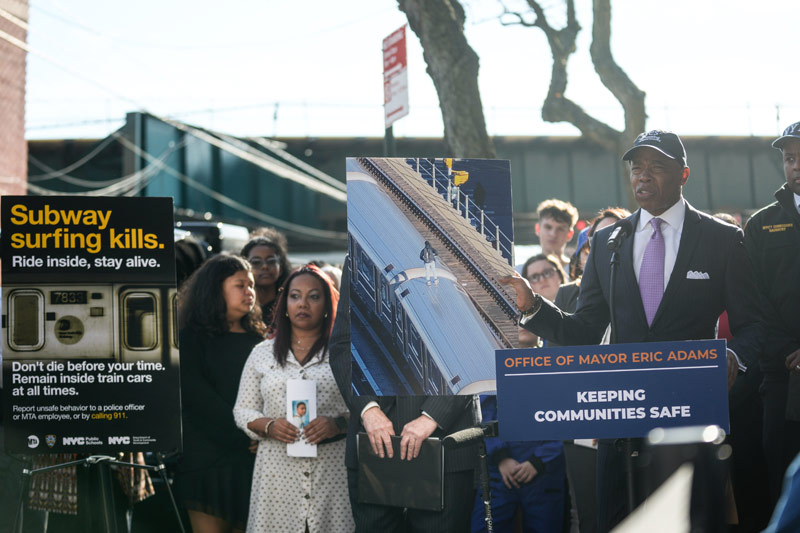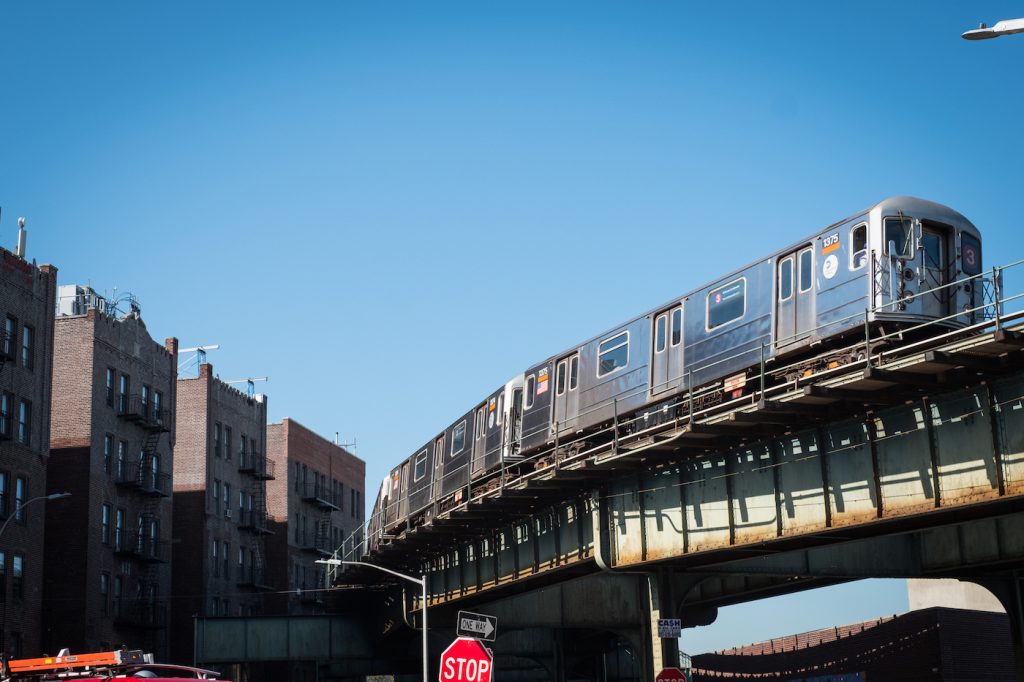BK Start-Ups Pitch Next Big Thing in Transportation Tech

Damir Gilyaz, founder of EZGlyd, attempts to woo an accomplished panel of judges at Make It In Brooklyn’s Future of Transportation Pitch Contest. Photo: Jack Delaney
By Jack Delaney | jdelaney@queensledger.com
On Tuesday, a Shark Tank-esque competition pitted fledgling Brooklyn tech companies — hawking drones, battery stations, and scooters — against each other for a shot at a check, and a stamp of approval for molding New York’s future transit systems.
The venue was auspicious. In 1807, seven years after inventing a usable submarine for Napoleon, the engineer Robert Fulton launched the world’s first commercially successful steamboat up the Hudson, putting New York City on the map as a center for innovative transportation. Over two hundred years later, and only one block away from a street bearing Fulton’s name, a handful of start-up founders were hoping to channel some of his magic.
The Future of Transportation Pitch Contest, which took place in the stylish rafters of Hana House in Downtown Brooklyn, had narrowed the field to just four finalists. The event was organized by Make It In Brooklyn, a Dowwwntown Brooklyn Partnership initiative to support the borough’s entrepreneurs that has given out over $120,000 in seed funding to date.
After an introduction by Downtown Brooklyn Partnership President Regina Myer, the evening was ushered along by emcee Jared Ais, an urban planner with a TikTok following (his handle is @TransitTalks). Filling out the roster were judges Phil Hwang of Dollaride, Judy Chang of the charging infrastructure company Itselectric, Dulcie Canton of CLIP!, NYCDOT veteran Dr. Jannie Gao, and Patrick Knoth, General Manager of Citi Bike.
The first presenter to brave the judges’ questioning was Damir Gilyaz, founder of EZGlyd. He said his product arose from a simple question: “What happens to your cargo scooter when it’s not in use?” The answer came to him while he was waiting for his daughter after her weekend math classes in Manhattan, watching traffic and musing over parking. He decided to design his own scooter, one that could “meet unmet needs for family and small business owners in high density areas,” he said, by using less space. The key features are that the vehicle can be folded vertically, has two removable batteries, and sports strong weather protection.
One judge asked how much the bike would cost to create. About $1,200 for manufacturing, Gilyaz replied, with a retail price starting at $2,400 to factor in other costs. He also fielded a question about his vision for the company’s future, to which he said that he was eager to expand to other cities in the Northeast if the pilot went smoothly in New York.

Avol founder Nate Poon and DBP President Regina Myer pose with the prize-winner’s check. Photo: Jack Delaney
The second challenger to approach the dais was David Hammer, President and co-founder of Popwheels.
“Right now in New York City,” Hammer said, “your pad thai is being schlepped by somebody on an e-bike.” Actually, he went on, that bike is probably one of two models, and they likely comprise one of the largest e-bike fleets in the world — over 100,000 vehicles, potentially. “This shows,” he said, “that electric mobility is not just for bougie Brooklyn dads, and I say this as [one], nor is it just for rich jerks. No, it’s for everybody. It’s for working people to be able to get their jobs done.”
But in Hammer’s telling, e-bike riders have two big problems. They’re plagued by battery fires, and the high cost of owning and operating a bike is also an issue. His company’s fix is to create a citywide battery swapping network, so that e-bikers and specifically delivery workers can recharge their batteries without having to return home.
When his presentation concluded, judges asked whether he was prepared for battery models to change. What if a new type of battery was incompatible with his kiosks? “There aren’t any new chemistries,” he answered, “that are likely to become online in the next five years that are going to radically reshape and increase by an order of magnitude the kind of the needs that meet micro mobility today.”
Third on deck was Nathan Poon, CEO and co-founder of Avol. Tall and lanky, he took a deep breath, then launched into his pitch for drones that can deliver blood, medication, and biopsies between medical centers.
“Medical deliveries are extremely slow,” he said, explaining the need for his invention. “There’s about 44 million of these deliveries every year, but almost all of them are done by car, which means they take a really long time. They’re limited by roads, traffic and weather conditions, and they’re limited by coordinating drivers. This results in about $30 billion worth of losses every year, just because blood, kidneys, and medications aren’t where they need to be when the patients actually need them.”
Drones had already been proposed to solve for this, he noted, but most models are heavily regulated. The trick is to design a drone that is light enough to avoid triggering regulation, yet heavy-weight and sturdy enough to carry the necessary materials over long distances. So that’s what Poon did, based on his PhD research. The result is a novel aircraft that “fits in the same regulatory class as a traditional quadcopter, but has five times the range and twice the payload volume.”
How do you deal with the fact that different municipalities may have different regulations for drones? Poon said that Avol gets around this issue by landing drones a mile or so outside of the target cities, and then paying couriers to ferry the medical supplies the rest of the way.
The fourth techie to take the stage was Victor Oribamise, CEO and co-founder of Kquika.
His company wants to minimize the amount of time that planes are out of commission, which Oribamise says costs airlines $3000 per plane, per hour. To accomplish this, he and his partners have designed an artificial intelligence-powered model that helps predict when a plane will need maintenance, before it actually does. “How does it work?” he asked, rhetorically. “We do real time data processing, and we have six behavior models to be able to predict all of these problems.”
As might be expected for an AI-driven product, a judge asked whether Oribamise’s software would replace human jobs. He replied that there aren’t currently enough maintenance engineers to go around, so his model would simply supplement the missing labor force.
The presentations were finished, and the crowd wandered off to the bar with their free drink tickets. Finally, after fifteen minutes of deliberation by the judges, emcee Ais announced that the winner was… Avol! Poon was swept to the stage, where he posed with a physically enormous (and financially modest) check for $5,000 to support his company’s growth.
It’s unclear if any of these ventures will take off. But if years from now you get a life-saving blood transfusion delivered to your hospital by drone, remember: it may have started here, just off Fulton St.

































